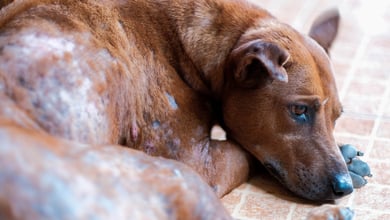8 Best Foods for Your Dog's Skin and Coat

Table of Contents
Summary: Joshua Montgomery, DVM suggests eight key foods for boosting your dog's skin and coat health, such as omega-rich fish, proteins, and vegetables. Always consult a veterinarian before dietary changes.
As a veterinarian at BetterVet, I see many dogs with itchy, irritated skin and hair loss from allergies. While some skin conditions require medical intervention, many pups show signs of improvement from simple tweaks in their diet.
Does Your Pet Have Skin Allergies?
1. How frequently does your pet seem itchy?
2. Where does your pet scratch the most?
3. Which season is your pet’s symptoms the most noticeable?
4. How often does your pet seem uncomfortable?
5. Can you see any of the following symptoms on your pet’s skin?
6. Is your pet experiencing any of the following symptoms?
View Results
Even if your furry friend does not suffer from skin allergies, any dog can benefit from these 8 immunity-boosting foods and ingredients:
1. Wild-Caught Fish
Salmon, trout, and other oily, wild-caught fish contain omega-3 and omega-6 fatty acids. A healthy balance of these essential fats reduce inflammation and support skin and coats in dogs.
2. Chicken
Lean animal proteins like chicken are essential for your dog’s skin and coat. Look for AAFCO-approved dog food with real chicken ingredients.
3. Beef
Beef and beef liver contain nutrients like Vitamin A, B, and E, all of which promote healthy skin and fur. Beef is also rich in zinc, which is crucial for a healthy immune system.
Look for high-quality dog food with real beef ingredients or add cooked beef liver to their diet.
4. Eggs
Eggs are full of biotin, protein, and healthy fats. Add a scrambled, boiled, or poached egg to your dog’s kibble for an extra shiny coat.
5. Grains
Whole grains like brown rice, quinoa, and oatmeal provide sustained energy and essential B vitamins, promoting smooth skin and fur growth.
Oats, in particular, contain omega-3 and omega-6 fatty acids and can calm irritated skin.
Keep reading: Grain-Free vs Grain Dog Food
6. High-Nutrient Vegetables
Sweet potatoes, carrots, kale, pumpkin, and spinach are superstars for your dog's skin and coat. They're loaded with vitamins, minerals, and antioxidants that can boost your dog’s overall health.
Plus, they add fiber for a happy gut, which can have a positive impact on your dog’s skin.
7. Oils with Healthy Fats
Coconut oil, flaxseed oil, and even peanut butter (in moderation) are excellent sources of healthy fats.
These fats add moisture to the skin and can reduce inflammation. Consult your veterinarian on the amount of oil to add to their food.
You can also offer a lick of natural peanut butter (but stay away from xylitol)!
8. Yogurt
Plain yogurt (or plain Greek yogurt) with its live cultures and probiotics, can be a great addition for dogs with sensitive skin or digestive issues.
Just make sure it's plain and unsweetened. Probiotics for dogs promote a healthy gut microbiome, which can improve skin health and reduce allergies.
Conclusion
Every dog is unique and their dietary needs may vary. Make sure to connect with a veterinarian before making any significant changes to your canine companion’s diet, especially if they have any underlying health conditions such as diet allergies. BetterVet offers in-home nutritional consultations as part of their Wellness Exam service.
Book an in-home or virtual appointment for more personalized advice on your dog's skin and coat health!
Does Your Pet Have Itchy Paws or Flaky Skin?
Our veterinarians can bring relief. Schedule a visit for allergy testing in the comfort of your home.
Frequently Asked Questions
How can I improve my dog's skin and coat?
In addition to feeding your dog a diet that includes the foods listed above, you can improve your dog’s skin and coat with regular baths, brushing, and flea and tick preventatives.
How do I choose dog food that is best for skin?
As part of our in-home Wellness Exams, our veterinarians can provide nutritional guidance for your dog, including recommending the best foods for their individual needs. There is no extra charge for this service; it is included in our comprehensive nose-to-tail exams.
What is the best food for a dog with sensitive skin?
There are several commercially available dog food brands that are formulated for a dog with skin problems and sensitivities. Ask your BetterVet veterinarian during your pet’s next in-home visit for specific recommendations, or book a virtual vet visit for expert online advice.
Article Information
This article was written by Dr. Joshua Montgomery, a graduate of Ross University School of Veterinary Medicine and licensed veterinarian with over 16 years of experience. Over the last decade, he’s worked as a general veterinary practitioner throughout the greater Seattle, WA area.
Dr. Montgomery’s philosophy is based on educating clients and providing them with option-based care to help them choose what is best for their companions. He currently writes content for BetterVet related to pet health care, symptoms, diseases, and conditions.
The BetterVet Team with the help of Dr. Joshua Montgomery wrote this article to provide pet parents with guidelines around dog food ingredients as well as information and support for skin and coat issues. Our expert veterinary team focuses on producing informative, factual, and scientifically-backed veterinary content for all pet owners.
This article was created through detailed research and by utilizing the extensive knowledge and expertise of our veterinarians. To develop the articles on our website, we follow strict editorial guidelines that ensure our content is factual, accurate, and medically reviewed by our team of veterinary professionals before it is published.
Our content is also put through scheduled updates to address any new information about the topic. This ensures that every article is as up-to-date and accurate as possible.





